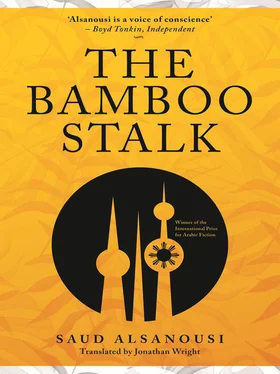The part of my patriotism that belonged to the Philippines was in full sway, running strong. ‘We threw them out in the end,’ I said.
Khawla was about to say something but she stopped and seemed to be thinking.
‘Why have you stopped talking?’ I asked.
She bowed her head and acted shy. ‘We threw them out in the end!’ she said.
I burst out laughing and looked at her defiantly.
‘Don’t be smug,’ she said. ‘If the Muslims had stayed there longer, the Spanish would never have got to the Philippines.’
When the conversation was about Islam, I could hardly tell who I was speaking to — Khawla or Ibrahim Salam.
7
A feeling like an electric shock hit me whenever I remembered Merla. When Mama Aida pressed Maria for news of her, Maria said, ‘She’s fine but she doesn’t want to talk to anyone.’ Mama Aida was reassured but I was sure Maria was hiding the truth. Merla didn’t answer my emails. I had sent dozens of messages, but it was no use. My last message went:
Merla, you are reading this message from me. You must be. The idea that you never open your email inbox terrifies me. Please answer me, if only with an empty message.
I was unusually frank with Merla, perhaps because I fully believed she had carried out what she had hinted at and couldn’t read what I was writing, or maybe because I believed she was somewhere reading my messages. I ended up saying things I had never said before, such as the feelings I had had towards her since early adolescence. I revealed to my cousin everything I used to conceal out of embarrassment. It was just an attempt to confess:
Merla, you may not know how I feel about you deep down. Or maybe you think that your admission to me one day that you weren’t attracted to the opposite sex might deter me from coming too close. Mama Aida tried but failed to make me stop thinking about you when she told me, when I was young, that the Church wouldn’t allow us to have a relationship. When you made your admission in one of the caves at Biak-no-Bato, you too failed to make me forget you. You are still the dream that visits me in my sleep and when I’m awake. Many of the girls I walk past every day here move something inside me but they fall short as soon as, unintentionally, I compare them to you.
I stopped writing to read what I had written on the screen. I didn’t know what to think. She wouldn’t read my confession, so I might as well say more.
Merla, did you know I felt jealous of José Rizal because he had such a strong influence on you? Although I admire him, I get upset when I read references to him in your messages. But in one of your messages you said something that stopped me feeling jealous. I felt very self-confident when you wrote, ‘You’re the only man I don’t feel hostile towards.’ When I read that I wanted to hug the laptop screen.
I had an overwhelming desire to hug her. I remembered her face in our last conversation by webcam. She looked tired but she was still Merla, the woman who came to me in my dreams to make me feel like a man. I would confess everything to her. She would read my confession. I had to say more.
Merla, I don’t know whether dead people read emails. But you’re not dead, are you? If you’re reading what I’m writing, please come back so that I can tell you something I’ve long wanted to say. I love you.
José Mendoza
* * *
Absence is a form of presence. Some people may be absent but they are present in our thoughts more often than when they are present in our lives. Merla’s absence was a constant presence. She visited me in my dreams to tell me things and for me to tell her things. When I woke up, I would continue our conversations awake. When I went back to sleep, in my dreams we would do rather more than just talk.
Death is powerless against the desire to meet, even if the meeting is of a different kind, in another world. We are loyal to the dead only because we hope to meet them again and believe that somewhere they are watching us and waiting.
I never lost hope of seeing Merla again. If I had lost that hope, I would have given up living shortly after she disappeared, just as Inang Choleng died after the death of the hope for which she had lived such a long life — my grandfather, Mendoza.
I didn’t reread what I had written in the last part of my message. I clicked on the ‘send’ button. I closed the email page and folded the laptop screen on to the keyboard. Behind the laptop there was the bottle with soil from my father’s grave. A question came to my mind: if I had to choose which one of them to bring back to life, my father or Merla, who would I choose?
I would choose my father.
Because Merla, a voice in the back of my head told me, was still alive.
* * *
For many days I didn’t open my email. I was confident, almost certain, that one message among the dozens of adverts would be from Merla.
I no longer thought about her being dead, as long as the hope inside me was still alive and kicking. I set about looking for a job. I would live in Kuwait like any other Filipino expatriate struggling to fulfil his dreams. In the Philippines I expected to fulfil my dream in Kuwait; in Kuwait a new dream started to take shape in my mind, a distant dream.
The fact that I hadn’t finished secondary school made it impossible to find a job in a private-sector company, as Khawla had hoped. After a gruelling search, with help from someone from the flat next door, I got a job in a well-known fast-food restaurant close to where I lived in Jabriya. My Filipino neighbour was working in the same restaurant. Khawla was disappointed when I told her about the job. ‘You don’t know what you’re worth, Isa. You’re Isa al-Tarouf! Grandmother will be shocked if she finds out that Rashid’s son is working in—’
I interrupted her. ‘But I was going to serve the guests at Umm Jabir’s place, with her blessing. Have you forgotten?’
‘But,’ said Khawla. She had nothing to add.
8
My work was in the kitchen, which was just behind the counter where they took the orders, and I was paid 170 dinars a month plus the National Workforce Subsidy that the government paid to Kuwaitis working in the private sector. I wore special clothes, like all the other staff. We kitchen staff were different from the others in that we had to wear hairnets and plastic gloves. On ordinary days the work wasn’t hard, but at the weekends it was. I worked like a robot, dipping chips in oil, cutting up lettuce leaves and onions and tomatoes, and taking the thin sheets of plastic off the slices of cheese while the pieces of meat were cooking, neatly arranged on the grill.
All the workers in the restaurant were from the Philippines except for two or three from India. The atmosphere at work was cheerful. One day when I was really busy, my colleague, who was also my neighbour, asked me why I had agreed to work there. ‘Kuwaitis don’t do this!’ he said.
‘You’re right. They don’t need to do this kind of work,’ I replied. ‘But they’re missing a great pleasure,’ I added in a mumble. I’m not sure I was being serious when I said this.
Some of the customers, many of them in fact, had really bad manners. I didn’t like the way they behaved at all, but at the same time I didn’t like what the restaurant staff did in response to the bad treatment they received from some people. Some people make themselves look bad by the way they treat others. I often heard someone shouting and swearing over something trivial, for example if the server had given them the wrong size of soft drink, or forgotten to add a slice of cheese to their burger. The server would apologise for making a mistake and replace the order, but unfortunately the angry customers had no idea they were about to devour something they never imagined. We kitchen staff would often hear people insulting and shouting at the staff who took the orders. The staff would quickly apologise, wheel around to face the kitchen and, red-faced in anger, shout, ‘One chicken burger with cheese special,’ for example. The word ‘ special’ meant something quite different from what the customer imagined. ‘Special?’ the kitchen staff would repeat before starting on the order. The server would nod, wink and say ‘special’ again. There’s no need to go into the details of how the special burgers differed from the usual burgers the restaurant served. When the mistake was corrected by removing a slice of tomato or adding slices of cheese, other ingredients might be added to the meal.
Читать дальше












